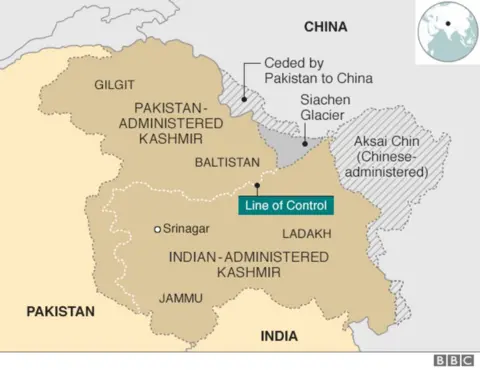The real enemy on the world's highest battlefield
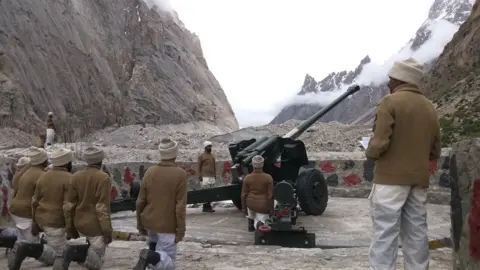 BBC
BBCThe Siachen glacier, in northern Kashmir, is regarded as the world's highest battlefield.
India and Pakistan both claim the area and have thousands of soldiers stationed there. It can be a deadly posting - but not because of ongoing fighting, as BBC Urdu's Abid Hussain reports.
At Siachen, heroes are not made from a hail of bullets or under enemy mortar fire. For the men posted at altitudes that range from 13,000-22,000ft (4,000-6,700m), death mostly comes from freezing temperatures, falls into crevasses or from being swept away by avalanches.
Since the conflict started in April 1984, Pakistan and India have lost between them close to 2,500 soldiers, according to official figures. Unofficially some put this figure at between 3,000 and 5,000. Nobody disputes that about 70% of all deaths at Siachen have been due to the harsh weather and terrain.
In fact, since India and Pakistan signed a ceasefire agreement in November 2003, not a single soldier from either side has died due to a battle wound.
"You have to understand that the soldiers' biggest enemy is nature - frigid weather and the lack of oxygen, not the troops stationed across from them," one medical doctor and Pakistan army veteran said. Like several of the soldiers I interviewed, he asked not to be named.
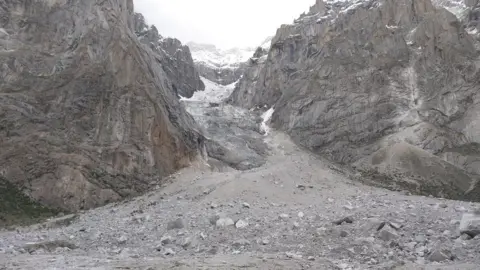
The worst loss of life in a single incident occurred five years ago, on 7 April 2012, when 140 members of Pakistan's Northern Light Infantry were buried in an avalanche. Ice and rock up to 150ft deep in places engulfed the Pakistan Army's Gayari Sector Battalion Headquarters, 20 miles west of Siachen.
Last year, India suffered a similar incident when a massive ice wall came crashing down on an Indian post, killing all nine men there.
None of this has ended the military stand-off, despite multiple rounds of talks.
Since the November 2003 ceasefire, troops posted to the glacier have had little to do. They spend between four and six hours a day manning their posts or going on patrol. But daily life still brings great challenges at the glacier.
Postings at Siachen mean preparing for a war against terrain that is inhospitable and cruel. Temperatures average around -20C throughout the year and plummet to -50C in winter. The wind chill adds another layer. But the biggest problem is lack of oxygen.
"The one thing we all take for granted is breathing, and that is often the most difficult thing to do here," said an army major, who had recently returned after serving eight months at a height of 18,000ft.
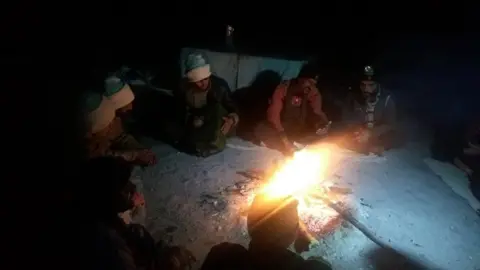
Trivial tasks such as shaving, going to the bathroom or brushing your teeth are treacherous because using cold water in extreme cold can lead to frostbite or, at worst, amputation. Preparing food is essentially a full-time job because the high altitude and low atmospheric pressure mean it takes three or four hours to cook lentils and rice.
Pakistan Army Col Aamer Islam, deputy commander for Siachen 323 Brigade, said that before being sent to Siachen, soldiers had to undergo rigorous training at the army's school of mountain warfare. There they are taught how to acclimatise, give first-aid, climb safely and move from one post to another while avoiding crevasses.
"The primary purpose of this training is to ensure that, more than anything else, the soldiers are able to carry out their daily tasks while surviving on barely sufficient oxygen," Col Islam said.
Lifeline
Once fully prepared, soldiers head for their posts carrying backpacks with essential items needed for the high altitude. The kit includes a sleeping bag, oxygen canisters, kerosene oil, ice axes, specialised ropes, gloves and socks. It weighs 25-30kg. The specialised snow boots the soldiers wear weigh almost 10kg.
Pakistan's soldiers begin their tenure in the Siachen region from brigade headquarters at Goma and gradually move towards higher posts. Col Islam says, ideally, soldiers should rotate every 45 days, especially those who are serving at posts higher than 18,000ft, but often due to the weather it is not possible.
With no electricity or gas, the soldiers have to rely on kerosene oil. "Kerosene oil, or K2 as we call it, is the lifeline of a post. We use it for heating our rooms, to charge our phones, to melt ice and boil water. It is our singular source of energy," the major said.
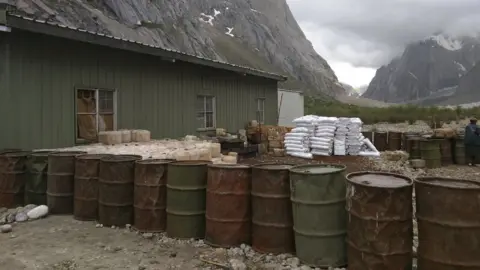
Often supplies are dumped to last up to 12 months. According to the medical officer, meals prepared using the military-grade dry food supplies were barely edible.
"To begin with, there is little appetite," he said. "Then, for the first two weeks of my posting, I was nauseous every single time I ate. It is something you'd never want to see, let alone eat. I had lost 22kg by the time I went back home."
The major said the hardest part of a posting to Siachen was working out what to do all day. "You don't know what to do next. All we have is each other and that is what we do. We talk."
The doctor agreed, saying: "There is no such thing as privacy or traditional hierarchy in a post that barely has enough space to accommodate six to eight people. We talk about our lives from the moment we were born to our wedding nights. Nothing is held back."
Small joys
The camaraderie, though, can only help so much. Life at high altitude can cause ailments including dizziness, fatigue, loss of appetite, swelling of the lungs and brain, insomnia, memory loss and depression.
"The sense of seclusion and distance drives people to clinical depression and insanity," the doctor said. "All you have is a vast swathe of snow and no signs of life. You are at top of the world yet entirely lonely."
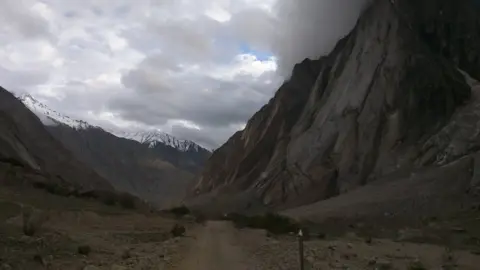
Another soldier, from a village near Multan, said that two weeks after he was posted to Siachen, his father died. He could not come down to attend the funeral. "Once you go on a forward post, it is not possible to immediately come back. You can mourn the death on your own, but that's about it."
There are also unexpected dangers. He said that, earlier this year, a colleague was attacked by a bear. "The soldiers are supposed to guard the post and he was doing his duty when he was attacked. At his yells for help, another soldier rushed out but the bear attacked him too," he said. One soldier died and the other lost a hand.
When the soldiers get an opportunity to celebrate, they seize it. Muhammad Shafiq, a soldier posted at 16,000ft, said that he followed the recent Champions Trophy cricket tournament in England - in which Pakistan beat India in the final - on the radio. After the victory, his colleagues danced and sang all night long.
Otherwise, people read books, play cards or board games such as Ludo. Some soldiers get together to sing songs, play the flute or spend time taking selfies at their stark temporary home.
"These small joys, these are all we have," said the army doctor, "Otherwise we'd all have acute depression. Fighting a war at this height is a deranged thing to do. It is nothing but madness."
